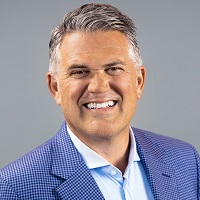How to Find Room for Philanthropy Despite Challenging Times
The 'philanthropic squeeze' hits when consumers face higher costs and lower investment returns. Consider these three ways to maintain charitable giving.


Profit and prosper with the best of Kiplinger's advice on investing, taxes, retirement, personal finance and much more. Delivered daily. Enter your email in the box and click Sign Me Up.
You are now subscribed
Your newsletter sign-up was successful
Want to add more newsletters?

Delivered daily
Kiplinger Today
Profit and prosper with the best of Kiplinger's advice on investing, taxes, retirement, personal finance and much more delivered daily. Smart money moves start here.

Sent five days a week
Kiplinger A Step Ahead
Get practical help to make better financial decisions in your everyday life, from spending to savings on top deals.

Delivered daily
Kiplinger Closing Bell
Get today's biggest financial and investing headlines delivered to your inbox every day the U.S. stock market is open.

Sent twice a week
Kiplinger Adviser Intel
Financial pros across the country share best practices and fresh tactics to preserve and grow your wealth.

Delivered weekly
Kiplinger Tax Tips
Trim your federal and state tax bills with practical tax-planning and tax-cutting strategies.

Sent twice a week
Kiplinger Retirement Tips
Your twice-a-week guide to planning and enjoying a financially secure and richly rewarding retirement

Sent bimonthly.
Kiplinger Adviser Angle
Insights for advisers, wealth managers and other financial professionals.

Sent twice a week
Kiplinger Investing Weekly
Your twice-a-week roundup of promising stocks, funds, companies and industries you should consider, ones you should avoid, and why.

Sent weekly for six weeks
Kiplinger Invest for Retirement
Your step-by-step six-part series on how to invest for retirement, from devising a successful strategy to exactly which investments to choose.
We have all been feeling the squeeze as of late, and philanthropy is feeling it, too. The costs of things we buy, be it food or clothing or even entertainment (have you seen the price of a baseball game recently?), seem only to go one way — higher.
According to the consumer price index, eggs increased in cost by 60% at the end of 2022, compared to how much they cost in 2021. Other kitchen staples, including butter, margarine and flour, increased in cost by 23% to 44%.
That's the first part of the "squeeze" — the other being that stocks, bonds and other assets have fallen. Economists blame inflation, pandemic remnants and supply-chain challenges.
From just $107.88 $24.99 for Kiplinger Personal Finance
Become a smarter, better informed investor. Subscribe from just $107.88 $24.99, plus get up to 4 Special Issues

Sign up for Kiplinger’s Free Newsletters
Profit and prosper with the best of expert advice on investing, taxes, retirement, personal finance and more - straight to your e-mail.
Profit and prosper with the best of expert advice - straight to your e-mail.
We're left with two issues: The things we use the money for are increasing in cost, and the sources of money's growth (stocks, bonds, etc.) are declining — hence, the squeeze. The financial squeeze may make us reconsider donating to the causes we care about, but now's the time to keep giving. Giving back is not only the right thing to do, but it also feels good to know you are making a positive impact in the world.
Here are a few ways to find room for philanthropy, even in challenging economic times.
1. Take a closer look at your finances.
If you still need to, now's the time to evaluate your finances and see if there's anything excessive to cut. Donate funds to a charity of choice by creating (and sticking to) a reasonable budget.
Once you can set aside money to donate, consider automating a monthly contribution so you won't be tempted to spend the money elsewhere.
Depending on your economic situation, you may also consider contributing to a donor-advised fund (DAF). A donor-advised fund allows investors to contribute to a charitable fund while still keeping control over the assets.
With these funds, donors get an immediate tax deduction while controlling how to invest the assets (including stocks, bonds, mutual funds, Bitcoin and crypto, among others) and for which charities over time.
Contributing to a DAF during a high-income year is a great opportunity to both maximize your philanthropic efforts and charitable tax benefits. A DAF allows you to start small and encounter far less of the red tape that comes with private foundations. A DAF also does not mandate a certain cadence with respect to grants. In fact, the capital continues to grow tax-free (though it is no longer yours) until you and your family decide which nonprofits you would like to support.
2. Make donating a family effort.
In September 2022, Patagonia's founder, Yvon Chouinard, transferred the company's ownership to two nonprofits fighting climate change. Patagonia estimates that $100 million annually will go toward environmental efforts.
To plan and implement his legacy gift, Chouinard established a board of trustees and included his family in the planning process. When a donor's family understands the big-picture goal, they'll likely want to support and contribute.
Donors who include their families in ongoing discussions about their intentions and details of the plan will find it easier to get them on board. Building fond memories of bonding over helping others will likely ensure a generational legacy and a smooth transition.
Not only can contributing to a nonprofit as a family create memories and a bond, but it also puts more resources in the same place. Instead of each family member donating to a different cause, multiple people support the same cause and create a more significant impact.
3. Support nonprofits in other ways.
There are several ways to support nonprofits that don't cost money but still make a big difference.
Start by volunteering your time. Nonprofits need helping hands to get things done. With volunteers, they can carry out their mission. Look for volunteer opportunities in your area related to causes you care about.
Donate your unused miles or points to a specific charity or a cause. If you're not using them, consider donating your credit card points or rewards cash to nonprofits. Donating points means no tax deduction, but you don't have to open your wallet to support your favorite nonprofit.
If you're ready to spring clean or declutter your home, there are so many helpful ways you can donate items to organizations in need. From books and cell phones to computers and eyeglasses, there's someone who can benefit from it. Just make sure to get a receipt for tax deductions!
Contractors and business owners may also consider donating their services to help a nonprofit. Teaching a class, providing consulting or working on a project pro bono is a way to support a cause.
Finally, spread the word about your favorite nonprofits. If you're active online, share social media posts from the organization to boost awareness or drop a donation link into your next email newsletter. Sharing, talking about and engaging with charitable organizations does make a difference.
Donations to charities have been on a roller coaster these last few years due to the pandemic and the financial market, and these organizations are feeling the squeeze on both ends. As donors, it is up to us to help charities continue to fight for important causes as much as possible.
ALINE Wealth is a group of investment professionals registered with Hightower Securities, LLC, member FINRA and SIPC, and with Hightower Advisors, LLC, a registered investment advisor with the SEC. Securities are offered through Hightower Securities, LLC; advisory services are offered through Hightower Advisors, LLC.
Profit and prosper with the best of Kiplinger's advice on investing, taxes, retirement, personal finance and much more. Delivered daily. Enter your email in the box and click Sign Me Up.

Peter J. Klein, CFA®, CAP®, CSRIC®, CRPS®, is the Chief Investment Officer and Founder of ALINE Wealth, a wealth management firm that specializes in providing clients with financial planning advice for every stage of their lives. Along with Peter’s deep financial wisdom, he adds considerable acumen in philanthropy, helping clients navigate family trusts, institutions, and nonprofits.
-
 Quiz: Do You Know How to Avoid the "Medigap Trap?"
Quiz: Do You Know How to Avoid the "Medigap Trap?"Quiz Test your basic knowledge of the "Medigap Trap" in our quick quiz.
-
 5 Top Tax-Efficient Mutual Funds for Smarter Investing
5 Top Tax-Efficient Mutual Funds for Smarter InvestingMutual funds are many things, but "tax-friendly" usually isn't one of them. These are the exceptions.
-
 AI Sparks Existential Crisis for Software Stocks
AI Sparks Existential Crisis for Software StocksThe Kiplinger Letter Fears that SaaS subscription software could be rendered obsolete by artificial intelligence make investors jittery.
-
 Social Security Break-Even Math Is Helpful, But Don't Let It Dictate When You'll File
Social Security Break-Even Math Is Helpful, But Don't Let It Dictate When You'll FileYour Social Security break-even age tells you how long you'd need to live for delaying to pay off, but shouldn't be the sole basis for deciding when to claim.
-
 I'm an Opportunity Zone Pro: This Is How to Deliver Roth-Like Tax-Free Growth (Without Contribution Limits)
I'm an Opportunity Zone Pro: This Is How to Deliver Roth-Like Tax-Free Growth (Without Contribution Limits)Investors who combine Roth IRAs, the gold standard of tax-free savings, with qualified opportunity funds could enjoy decades of tax-free growth.
-
 One of the Most Powerful Wealth-Building Moves a Woman Can Make: A Midcareer Pivot
One of the Most Powerful Wealth-Building Moves a Woman Can Make: A Midcareer PivotIf it feels like you can't sustain what you're doing for the next 20 years, it's time for an honest look at what's draining you and what energizes you.
-
 I'm a Wealth Adviser Obsessed With Mahjong: Here Are 8 Ways It Can Teach Us How to Manage Our Money
I'm a Wealth Adviser Obsessed With Mahjong: Here Are 8 Ways It Can Teach Us How to Manage Our MoneyThis increasingly popular Chinese game can teach us not only how to help manage our money but also how important it is to connect with other people.
-
 Looking for a Financial Book That Won't Put Your Young Adult to Sleep? This One Makes 'Cents'
Looking for a Financial Book That Won't Put Your Young Adult to Sleep? This One Makes 'Cents'"Wealth Your Way" by Cosmo DeStefano offers a highly accessible guide for young adults and their parents on building wealth through simple, consistent habits.
-
 Global Uncertainty Has Investors Running Scared: This Is How Advisers Can Reassure Them
Global Uncertainty Has Investors Running Scared: This Is How Advisers Can Reassure ThemHow can advisers reassure clients nervous about their plans in an increasingly complex and rapidly changing world? This conversational framework provides the key.
-
 I'm a Real Estate Investing Pro: This Is How to Use 1031 Exchanges to Scale Up Your Real Estate Empire
I'm a Real Estate Investing Pro: This Is How to Use 1031 Exchanges to Scale Up Your Real Estate EmpireSmall rental properties can be excellent investments, but you can use 1031 exchanges to transition to commercial real estate for bigger wealth-building.
-
 Should You Jump on the Roth Conversion Bandwagon? A Financial Adviser Weighs In
Should You Jump on the Roth Conversion Bandwagon? A Financial Adviser Weighs InRoth conversions are all the rage, but what works well for one household can cause financial strain for another. This is what you should consider before moving ahead.